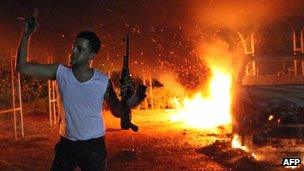Arab, regional media outraged by prophet film
- Published

The US consulate compound in Benghazi was set on fire by protesters late on 11 September
There has been criticism in pan-Arab and regional media of the US-produced film which has provoked violent protests in Egypt and Libya. It features an actor portraying the Prophet Muhammad, which is forbidden in Islam. The film is reportedly being promoted by two US-based Egyptian Christians (Copts), and said to be directed by an Israeli American.
'Offensive to the Prophet'
The media in Egypt on 12 September highlighted the previous day's protests outside the US embassy in Cairo.
The daily Al-Yawm al-Sabi said Egypt's Coptic community had distanced itself from the film. The Coalition of Egypt's Copts has rejected "any attempts to insult or show contempt for religions and trigger sedition between people of religion at the international level", the paper said.
Pro-government daily Rose al-Yusuf led with the following headline: "The authority of expatriate Copts insults Egypt's Copts: You are cowards."
State-run Al-Ahram carried a picture of protesters carrying a banner saying: "Anything but God's Prophet."
The presenter of the morning show on state-run Nile News TV said the film was aimed at "triggering sedition", but, she went on to say, Egyptian society stood firm against such attempts.
"All Egyptian churches condemn this film and any other film that insults any of the prophets," the presenter said.
A talk show on Egypt's state-owned Channel One, hosted Mahmud Nafadi, the deputy editor-in-chief of the state-owned Al-Jumhuriyah newspaper.
He pointed out that Christians as well as Muslims in Egypt condemned the film, and praised the press for describing the protests as "public anger" rather than "religious anger".
'Vilifying Islam'
There was also condemnation of the film in the wider region and the pan-Arab press.
"Documentary films and cartoons insulting the Prophet are not new," said an editorial in London-based Arab nationalist paper Al-Quds Al-Arabi. "What is new about this film production is that the producers belong to an organisation of Copts in the Diaspora who are being supported by some right-wing US fundamentalist Christian forces."
"This group which is vilifying Islam and Muslims, is seeking to destabilise Egypt and to spark the fire of sectarian violence," said the paper.
Iran's English-language Press TV led its early morning news bulletin on 12 September on the "anti-Islam" film. It quoted a US-based Muslim cleric as saying that "Zionist owners of US media are sponsors of such an attack on Islam".
In Libya itself, the media on 12 September largely relied on foreign news organisations such as Al-Jazeera and Reuters to report the attack on the US consulate in Benghazi the previous evening.
Privately-owned Al-Tadamun news agency published a brief factual report, and private Al-Watan newspaper carried a report with an image of a screen caption from Al-Jazeera TV reporting the incident in an "urgent" news caption.
Private newspaper Quryna published a Reuters account of the attack.
BBC Monitoring, external reports and analyses news from TV, radio, web and print media around the world. For more reports from BBC Monitoring, click here
- Published12 September 2012
- Published12 September 2012